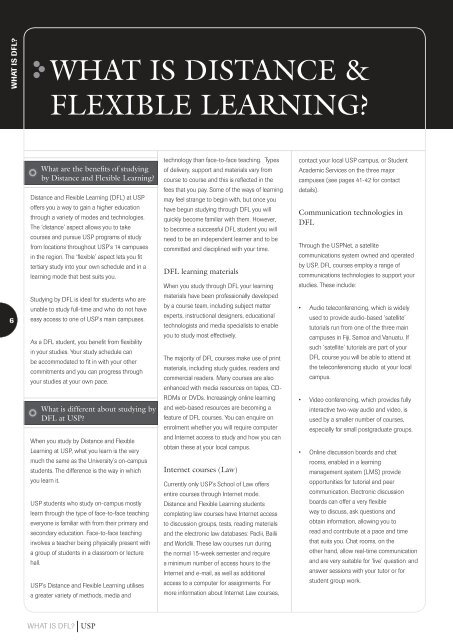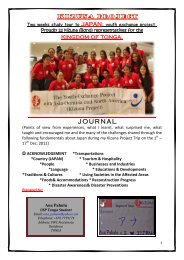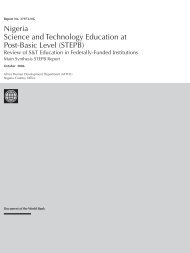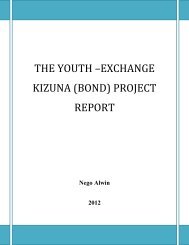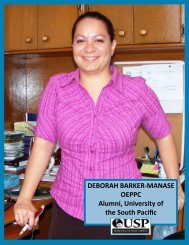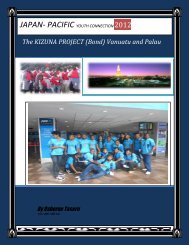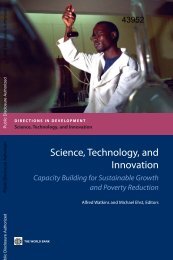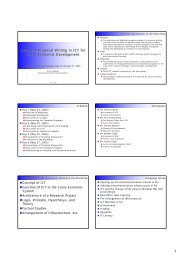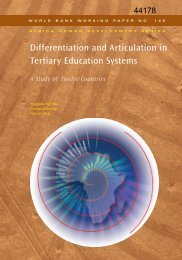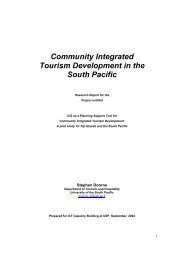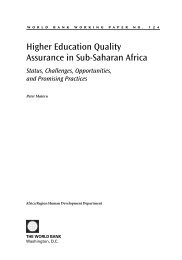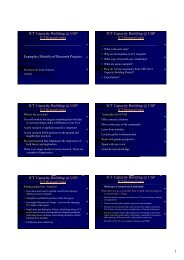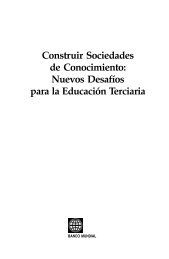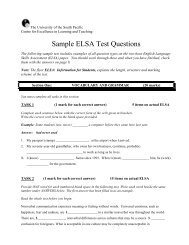our future, your future 2007 distance and flexible learning handbook
our future, your future 2007 distance and flexible learning handbook
our future, your future 2007 distance and flexible learning handbook
You also want an ePaper? Increase the reach of your titles
YUMPU automatically turns print PDFs into web optimized ePapers that Google loves.
WHAT IS DFL?<br />
WHAT IS DISTANCE &<br />
FLEXIBLE LEARNING?<br />
<br />
What are the benefits of studying<br />
by Distance <strong>and</strong> Flexible Learning?<br />
Distance <strong>and</strong> Flexible Learning (DFL) at USP<br />
offers you a way to gain a higher education<br />
through a variety of modes <strong>and</strong> technologies.<br />
The ‘<strong>distance</strong>’ aspect allows you to take<br />
c<strong>our</strong>ses <strong>and</strong> pursue USP programs of study<br />
from locations throughout USP’s 14 campuses<br />
in the region. The ‘<strong>flexible</strong>’ aspect lets you fit<br />
tertiary study into y<strong>our</strong> own schedule <strong>and</strong> in a<br />
<strong>learning</strong> mode that best suits you.<br />
Studying by DFL is ideal for students who are<br />
unable to study full-time <strong>and</strong> who do not have<br />
easy access to one of USP’s main campuses.<br />
As a DFL student, you benefit from flexibility<br />
in y<strong>our</strong> studies. Y<strong>our</strong> study schedule can<br />
be accommodated to fit in with y<strong>our</strong> other<br />
commitments <strong>and</strong> you can progress through<br />
y<strong>our</strong> studies at y<strong>our</strong> own pace.<br />
What is different about studying by<br />
DFL at USP?<br />
When you study by Distance <strong>and</strong> Flexible<br />
Learning at USP, what you learn is the very<br />
much the same as the University’s on-campus<br />
students. The difference is the way in which<br />
you learn it.<br />
USP students who study on-campus mostly<br />
learn through the type of face-to-face teaching<br />
everyone is familiar with from their primary <strong>and</strong><br />
secondary education. Face-to-face teaching<br />
involves a teacher being physically present with<br />
a group of students in a classroom or lecture<br />
hall.<br />
USP’s Distance <strong>and</strong> Flexible Learning utilises<br />
a greater variety of methods, media <strong>and</strong><br />
technology than face-to-face teaching. Types<br />
of delivery, support <strong>and</strong> materials vary from<br />
c<strong>our</strong>se to c<strong>our</strong>se <strong>and</strong> this is reflected in the<br />
fees that you pay. Some of the ways of <strong>learning</strong><br />
may feel strange to begin with, but once you<br />
have begun studying through DFL you will<br />
quickly become familiar with them. However,<br />
to become a successful DFL student you will<br />
need to be an independent learner <strong>and</strong> to be<br />
committed <strong>and</strong> disciplined with y<strong>our</strong> time.<br />
DFL <strong>learning</strong> materials<br />
When you study through DFL y<strong>our</strong> <strong>learning</strong><br />
materials have been professionally developed<br />
by a c<strong>our</strong>se team, including subject matter<br />
experts, instructional designers, educational<br />
technologists <strong>and</strong> media specialists to enable<br />
you to study most effectively.<br />
The majority of DFL c<strong>our</strong>ses make use of print<br />
materials, including study guides, readers <strong>and</strong><br />
commercial readers. Many c<strong>our</strong>ses are also<br />
enhanced with media res<strong>our</strong>ces on tapes, CD-<br />
ROMs or DVDs. Increasingly online <strong>learning</strong><br />
<strong>and</strong> web-based res<strong>our</strong>ces are becoming a<br />
feature of DFL c<strong>our</strong>ses. You can enquire on<br />
enrolment whether you will require computer<br />
<strong>and</strong> Internet access to study <strong>and</strong> how you can<br />
obtain these at y<strong>our</strong> local campus.<br />
Internet c<strong>our</strong>ses (Law)<br />
Currently only USP’s School of Law offers<br />
entire c<strong>our</strong>ses through Internet mode.<br />
Distance <strong>and</strong> Flexible Learning students<br />
completing law c<strong>our</strong>ses have Internet access<br />
to discussion groups, tests, reading materials<br />
<strong>and</strong> the electronic law databases: Paclii, Bailii<br />
<strong>and</strong> Worldlii. These law c<strong>our</strong>ses run during<br />
the normal 15-week semester <strong>and</strong> require<br />
a minimum number of access h<strong>our</strong>s to the<br />
Internet <strong>and</strong> e-mail, as well as additional<br />
access to a computer for assignments. For<br />
more information about Internet Law c<strong>our</strong>ses,<br />
contact y<strong>our</strong> local USP campus, or Student<br />
Academic Services on the three major<br />
campuses (see pages 41-42 for contact<br />
details).<br />
Communication technologies in<br />
DFL<br />
Through the USPNet, a satellite<br />
communications system owned <strong>and</strong> operated<br />
by USP, DFL c<strong>our</strong>ses employ a range of<br />
communications technologies to support y<strong>our</strong><br />
studies. These include:<br />
• Audio teleconferencing, which is widely<br />
used to provide audio-based ‘satellite’<br />
tutorials run from one of the three main<br />
campuses in Fiji, Samoa <strong>and</strong> Vanuatu. If<br />
such ‘satellite’ tutorials are part of y<strong>our</strong><br />
DFL c<strong>our</strong>se you will be able to attend at<br />
the teleconferencing studio at y<strong>our</strong> local<br />
campus.<br />
• Video conferencing, which provides fully<br />
interactive two-way audio <strong>and</strong> video, is<br />
used by a smaller number of c<strong>our</strong>ses,<br />
especially for small postgraduate groups.<br />
• Online discussion boards <strong>and</strong> chat<br />
rooms, enabled in a <strong>learning</strong><br />
management system (LMS) provide<br />
opportunities for tutorial <strong>and</strong> peer<br />
communication. Electronic discussion<br />
boards can offer a very <strong>flexible</strong><br />
way to discuss, ask questions <strong>and</strong><br />
obtain information, allowing you to<br />
read <strong>and</strong> contribute at a pace <strong>and</strong> time<br />
that suits you. Chat rooms, on the<br />
other h<strong>and</strong>, allow real-time communication<br />
<strong>and</strong> are very suitable for ‘live’ question <strong>and</strong><br />
answer sessions with y<strong>our</strong> tutor or for<br />
student group work.<br />
WHAT IS DFL? USP


